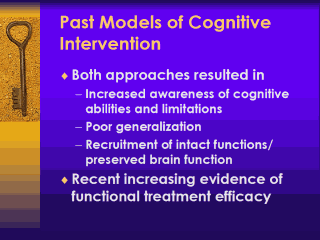 |
These approaches in the past have both resulted I think in an
increased awareness of peopleís cognitive strengths and cognitive limitations; thatís
been good. Not so good is that things donít generalize well. People learn some things in
the hospital in a few rehab settings; they go home and it seems like they were never here.
Thatís been a big problem and typically weíve thought in terms of what is actually
happening here. Weíve thought that people were probably recruiting intact areas of
cognitive function and preserved brain areas. Although we joked about it and we thought
wouldnít it be nice if we were actually fixing peopleís brains we didnít have a lot
of support for that and we would actually kind of educate families and patients that that
was not our agenda. Of course, we have some recent evidence increasing dramatically about
brain changing due to some of the things we do. And recently there has also been a big
meta-analysis of cognitive intervention with people with brain injuries and it looks like
it does work in terms of function improving though not at work in terms of fixing
peopleís brains - we donít know. To make a long story short, Iíve done this for a
long time. A lot of people in rehab have. So we have a lot of opinions or gut feelings
when somebody says Iím getting older and how do I keep my brain from having problems Ė
how do I keep myself from having cognitive impairment. |
